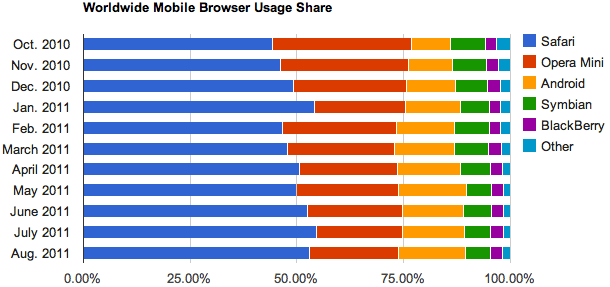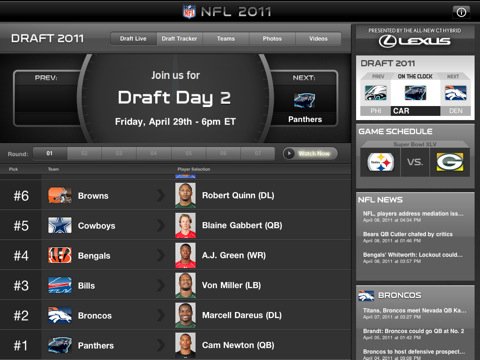Apple’s Safari accounted for 53 percent of web browser usage on mobile devices and tablets in August, more than 30 percentage points ahead of the nearest competitor Opera Mini. Much of the success of mobile Safari can be attributed to the popularity of the iPad and recent studies show that most people with an iPad use it primarily as a web browser. It’s so popular as a browser that the iPad grabs 25% of US mobile browser market and 2% of the overall browser market, on the otherside Android has yet to produce a competitive tablet and most measurable web browsing activity is coming from smartphones. Smartphones are convenient for occasional searching on the go and the smaller screen is not designed for extended browsing sessions……………
New statistics show a competitive volatility in the the mobile browser market absent from the slower-moving personal computer browser market and Net Applications has long shown the total browser usage worldwide based on visits to a collection of Web sites using its analytics software. Now, though, it’s separated PC browsing on desktops and laptops from mobile browsing on phones and tablets. With PCs, the story remains largely unchanged: Microsoft‘s Internet Explorer continues its gradual slide while Google’s Chrome and Apple‘s Safari gradually rise. But in the mobile market, there’s a lot more jitter in the statistics. Apple‘s Safari, used on iPhones, iPads and iPod Touches, is the dominant browser, rising from 44.3 percent of usage in October 2010 to 53.0 percent in August 2011. And although the overall ranking of the top five browsers hasn’t changed in the last year, it appears likely Google‘s unbranded Android browser will take the No. 2 spot from Opera Mini in coming months. From October 2010 to August 2011, Opera Mini dropped in usage from 32.4 percent to 20.8 percent. Android‘s browser rose from 9.2 to 15.7 percent, according to the Net Applications statistics. Also on a downward trend is the Symbian browser, which dropped from 8.1 percent to 5.8 percent. Blackberry’s browser, in fifth place, edged from 2.7 percent to 2.9 percent. Mobile browsing deserves more attention on its own now, Net Applications said. “The combination of mobile and tablet usage has continued to rise dramatically and is now over 6 percent (and accelerating) of all browsing on the Internet.” With Net Applications‘ new methodology, the personal computer browsers didn’t change place, but Chrome came out better and Safari came out worse once the mobile browsers were split off into their own category.
[ttjad keyword=”iphone”]




